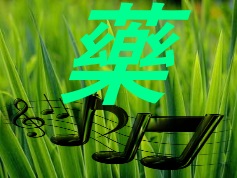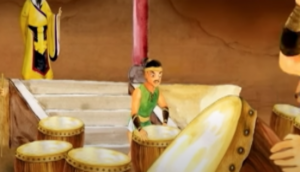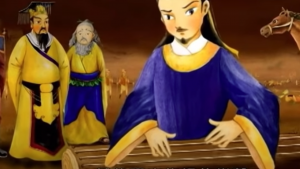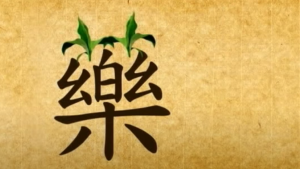 According to a legend, during the ancient times, a war between good and evil broke out in China. It was between the benevolent emperor, The Yellow Emperor, who had the support of all his people and a man named Chiyou from the north who had great strength. Chiyou believed that he had a right to the throne, and constantly confronted the emperor’s troops with his own. During the war, the citizens of China were suffering the most, lacking food and shelter. The emperor was both anxious and sad for his people. One night, an angel came to the emperor’s dreams and told him to craft large drums out of cowhide; these drums could restrain Chiyou and his troops, and ultimately put an end to the war. After the emperor woke up, he immediately handed over this task to the craftsmen who completed a total of eighty-eight drums.
According to a legend, during the ancient times, a war between good and evil broke out in China. It was between the benevolent emperor, The Yellow Emperor, who had the support of all his people and a man named Chiyou from the north who had great strength. Chiyou believed that he had a right to the throne, and constantly confronted the emperor’s troops with his own. During the war, the citizens of China were suffering the most, lacking food and shelter. The emperor was both anxious and sad for his people. One night, an angel came to the emperor’s dreams and told him to craft large drums out of cowhide; these drums could restrain Chiyou and his troops, and ultimately put an end to the war. After the emperor woke up, he immediately handed over this task to the craftsmen who completed a total of eighty-eight drums.
 A few days later when the two armies once again clashed, the emperor’s men beat the drums, the powerful sound shaking the world. As the angel had promised, Chiyou and his men were shocked to death, at last ending the war. The emperor was overjoyed, but when he turned back to see his own soldiers dying, he quickly gathered a couple of musicians in hopes of coming up with a cure. The musicians used the string from the bows of the wounded soldiers and tied them to pieces of wood. They began to play. Once the melodious music reached the soldiers’ ears, the wounds were healed and they miraculously awakened. At that time, the emperor’s historian, Cangjie, saw the miracle happen and created the word ‘music’. The character became a symbol of the sound that can be used to heal. Decades later, people also found out that many natural plants and herbs can also be used to heal or treat illnesses, so they combined the characters ‘music’ and ‘herbs’ to create a new character: medicine.
A few days later when the two armies once again clashed, the emperor’s men beat the drums, the powerful sound shaking the world. As the angel had promised, Chiyou and his men were shocked to death, at last ending the war. The emperor was overjoyed, but when he turned back to see his own soldiers dying, he quickly gathered a couple of musicians in hopes of coming up with a cure. The musicians used the string from the bows of the wounded soldiers and tied them to pieces of wood. They began to play. Once the melodious music reached the soldiers’ ears, the wounds were healed and they miraculously awakened. At that time, the emperor’s historian, Cangjie, saw the miracle happen and created the word ‘music’. The character became a symbol of the sound that can be used to heal. Decades later, people also found out that many natural plants and herbs can also be used to heal or treat illnesses, so they combined the characters ‘music’ and ‘herbs’ to create a new character: medicine.
 The ancestors of ‘medicine’ equals to ‘music’ and ‘herb’
The ancestors of ‘medicine’ equals to ‘music’ and ‘herb’
We all know that the character ‘medicine’ is made up of ‘herb’ and ‘music’. ‘Herb’ includes all the important foods essential to human health, such as wheat, rice, fruits, vegetables, and so on. ‘Music’ accounts for most of the character, so it plays a pivotal role. The ancients believed that each music note had a natural effect on the corresponding organs. For example, the note ‘Do (1)’ is melodious and invigorating. ‘Re (2)’ is deep and resonant, and can bring tranquility. ‘Mi (3)’ is smooth and can enhance slumber, while ‘So (5)’ is full of energy and can repress stress. ‘La ( 6)’ is soft and thorough and can enlighten the mind. Different types of music bring different feelings. Pure, bright music can cultivate people’s sentiments, purify the mind, and achieve the effect of treatment. Wild, passionate music will only trigger people’s impulsive, hysterical urges and indulge lust. So the real music is the magic, it is a good mood, giving benefits, giving health, giving the right energy! The character ‘music’ can also be read as ‘happiness’. The ancients said, ‘A good heart works like herbs.’ Those who are happiest always hold a good heart. On the contrary, a person filled with hate will never be happy or healthy, as their hearts are not kind.
 Spiritual and substance are one in same
Spiritual and substance are one in same
In traditional Chinese, the characters ‘music’ and ‘herb’ combine together to make the character for ‘medicine’. ‘Music’ can soothe people’s spirits, and ‘herbs’ can provide humans nutrition. Chinese culture is broad and profound – behind every traditional character is a museum with rich connotations and Divine culture. Through examining the character ‘medicine’, we have found a revelation: health from human body , mind and spirit.
Translated and edited by Ireen Chau
23 Apr 2020
The Origin of The Chinese Character – Medicine ( 藥)
We all know that the character ‘medicine’ is made up of ‘herb’ and ‘music’. ‘Herb’ includes all the important foods essential to human health, such as wheat, rice, fruits, vegetables, and so on. ‘Music’ accounts for most of the character, so it plays a pivotal role. The ancients believed that each music note had a natural effect on the corresponding organs. For example, the note ‘Do (1)’ is melodious and invigorating. ‘Re (2)’ is deep and resonant, and can bring tranquility. ‘Mi (3)’ is smooth and can enhance slumber, while ‘So (5)’ is full of energy and can repress stress. ‘La ( 6)’ is soft and thorough and can enlighten the mind. Different types of music bring different feelings. Pure, bright music can cultivate people’s sentiments, purify the mind, and achieve the effect of treatment. Wild, passionate music will only trigger people’s impulsive, hysterical urges and indulge lust. So the real music is the magic, it is a good mood, giving benefits, giving health, giving the right energy! The character ‘music’ can also be read as ‘happiness’. The ancients said, ‘A good heart works like herbs.’ Those who are happiest always hold a good heart. On the contrary, a person filled with hate will never be happy or healthy, as their hearts are not kind.
In traditional Chinese, the characters ‘music’ and ‘herb’ combine together to make the character for ‘medicine’. ‘Music’ can soothe people’s spirits, and ‘herbs’ can provide humans nutrition. Chinese culture is broad and profound – behind every traditional character is a museum with rich connotations and Divine culture. Through examining the character ‘medicine’, we have found a revelation: health from human body , mind and spirit.
Translated and edited by Ireen Chau